
Opportunitiescircle 4
How to write a personal statement for scholarship | tips with example/template.
- February 5, 2024
- by Opportunitiescircle 4
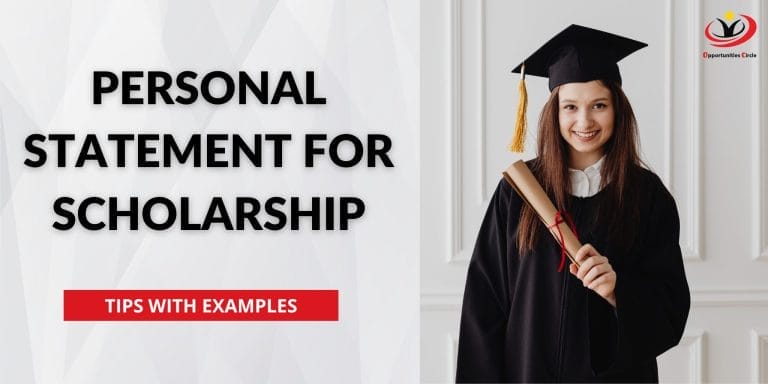
Are you ready to apply but stuck with a Personal Statement for Scholarship? International Scholarship is a transformative journey that opens the door to success through financial assistance, but it comes with some requirements. While applying for a scholarship, you may need to submit several documents, including a Personal Statement for a Scholarship. As scholarship competition is fierce, a scholarship personal statement for undergraduates and masters needs to stand out and make an impact to distinguish you from the crowd.
This comprehensive guide will highlight how to write a personal statement for a scholarship within the word limit, provide personal statement examples, and provide other tips for writing a personal statement for master’s and undergraduate students. A personal statement for Scholarship is not just about listing your achievements; it’s about narrating a story that convinces the selection committee to select you for the Scholarship. This guide will break down the steps to write a personal statement for a Scholarship that stands out. After following the instructions, you will be able to impact the selection committee and convince them that you’re the right fit for the grant or Scholarship. So, get ready to dive into this journey of self-discovery together. Your personal statement is more than just words on paper; it’s the key to unlocking the Scholarship you aim for. So, let’s make it awesome!
What is a Personal Statement?
A personal statement is a document intended to introduce yourself, share your background, highlight your achievements, and express your goals and aspirations to achieve any international scholarship . A personal statement aims to showcase your qualities, accomplishments, relevant experiences, motivation, and interests, helping the committee understand why you are a deserving candidate for the scholarship. A personal statement portrays your personality and tells why you’re the perfect candidate for the scholarship.
Your personal statement helps you connect better with the selection committee that showcases your narrative, uniqueness, and contribution to the academic world. Usually, a personal statement for the scholarship includes details about your academic and career goals, community involvement (social work), challenges you may have overcome, and any other factors that make you a right fit for the scholarship. Now the question ‘What is a personal statement’ is clear, let’s head to how to write a personal statement. Do not worry; a sample personal statement is given at the end, where you can see how to write about your interests and write a personal statement for scholarships.
Crafting an Exceptional Personal Statement for Scholarship
It is pertinent to comprehend the instructions and criteria for a personal statement for a scholarship application in detail. After comprehensively understanding the scholarship’s goal and objectives, improvise and structure your personal statement sample by resonating with the personal statement criteria to become a standout candidate poised for academic excellence.
Write a Compelling Story
Drafting a compelling story for a personal statement for scholarship format and structure would be great. You can write a captivating introduction by sharing a defining experience or moment and a personal anecdote that makes you unique and inspires you to follow a goal in your career.
Highlight Achievements
Try to include the most relevant achievement and link it with the question in the personal statement. (Look at the sample template given at the end under the personal statement heading for the scholarship sample, template, and tips.) Explain and highlight your leadership roles, academic accomplishments, extracurricular activities, etc. Most important is to write about your involvement in community and social services. Highlight your interest, commitment, and discipline of interest.
Personal Growth and Development
A sample personal statement for scholarship application discusses challenges and how they shaped you as a person. How did that contribute to your personal development of character, perspective, and resilience? Include how you were able to overcome the difficulties and grow from adversity.
Use Examples to Share Your Narrative
Use examples to share your experiences and plans. You must prove that you are aware of the responsibility you have been assigned and how you will use this opportunity to accomplish your goals. Separately describing your short-term and long-term goals will help them better understand your skills and plans and if you’re the right candidate to be awarded the scholarship to study abroad.
Be Authentic
Structure and examples of personal statements for scholarships should be solely and utterly based on truth to yourself and the scholarship committee. Avoid over-exaggerations and be detailed. Your personal experiences should be related to your goals and future career aspirations.
Why Do Scholarship Committees Require Personal Statements?
The selection committee uses personal statements for scholarship for selection purposes to gain a holistic and deep understanding of applicants. This understanding goes beyond their academic achievements and grades. As a scholarship committee, it wants to identify passionate individuals who, along with excelling academically, possess qualities such as leadership, determination, and strong commitment to their culture and community. Only a well-written personal statement can help the committee assess your suitability for the scholarship and your potential to contribute positively to your field of study and society.
Common Scholarship Personal Statement Prompts
The following prompt asks for both a personal statement for a scholarship sample of 500 words and a personal statement for a scholarship sample of 250 words. Scholarship personal statement prompts can generally differ in a wide range, but some commonly held themes exist. Some common prompts include:
- Describe your academic and professional goals.
- Discuss any pertinent challenge you’ve overcome and how it has shaped you.
- Give a reason why you are a strong candidate for this scholarship.
- Explain your extracurricular activities, community/social service, or leadership roles.
- Discuss your passion for your field of study and how you can contribute to it in the future.
These are some of the generally asked questions. However, it is essential to understand the specific prompt for each scholarship as it guides the structure, content, and focus of your personal statement. Make sure to include all the relevant themes in your response.
How to Write a Personal Statement for Scholarship
Thoroughly researching the Scholarship Opportunities is very important to know every detail about it and make sure to complete all significant instructions of scholarship information as each scholarship might consist of different requirements, eligibility criteria, and questions. It is essential to map out a chart online or on a notepad related to your deadlines, planning, values, and support you may require to submit for your scholarship. You must be thinking about how to write a personal statement for scholarship. Don’t worry; Opportunities Circle is here to help you write a scholarship-winning personal statement. We have listed some steps for writing a personal statement for scholarship.
Reflect on Qualifications and Goals
Assess your academic qualification and extracurricular achievements and how they relate to your strategic or long-term goals. Your personal statement for the scholarship (250 or 500 words typically) consists of why you are a strong candidate for the scholarship, what makes you different from others, and why you should be awarded the scholarship opportunity.
Create a Timeline
Time division is one of the most vital considerations when applying for an international or national scholarship abroad. Even within scholarship, each section and subpart of it should be given particular deadlines, like writing a personal scholarship. Creating a timeline allows you to finish your personal statement well before time. The earlier you start, the more opportunity you have to draft, make revisions, and seek feedback from peers, mentors, or others. Refrain from procrastinating as it can lead to rushed and incomplete submissions, so it’s essential to plan your personal statement for the scholarship draft or sample carefully.
Formatting and Style
Formatting and style should follow the pattern provided by the scholarship committee or university. Adhering to all the details like formatting, font, or length guidelines provided by the scholarship committee is the first thing in mind when a student thinks ‘about how to write a personal statement for a scholarship’. Follow the instructions to avoid disqualification. The second point for writing a personal statement for scholarship is to use a professional and clear writing style. Avoid slang and informal tone, and don’t drag the content; be specific and to the point. Proper editing and Proofreading: make sure that your personal statement for scholarship, for both 250 words and 500 words, is free of grammatical errors and typos. Thoroughly proofread your work.
Additional Tips for Personal Statement for Scholarship
- Action matters the most: use specific detailed examples and experiences in the industry to support your CV. For example, don’t say you are a leader; narrate your leadership experience.
- Compelling Opening: The beginning of any personal statement for scholarship undergraduate and postgraduate should capture the committee’s attention.
- Share some personal story or a thought.
- Connect Your Experiences to Your Goals: A personal statement should explain the connection of your past experiences with your goals. Then relate it to how achieving the scholarship will help you achieve that goal.
- Address Potential Weaknesses: Address your weakness honestly and positively in your personal statement for scholarship application. Weaknesses can be any gap in your academic records.
- Stay Confident and optimistic: Maintain a positive and confident tone throughout your personal statement. Convey your belief in your abilities and your commitment to your goals.
- Enthusiasm: Your personal statement for scholarship should prove your genuine enthusiasm for your future goal in your field of study.
- Be focused, specific, and concrete: Try to give relevant examples only; even the experience in those examples should be straightforward. Follow the word limit and stay on topic.
Personal Statement Examples:
Personal statement for scholarship example #1.
Hailing from an agricultural village in Punjab (Pakistan), I have had a very close relationship and understanding of agriculture and farming since a young age. Farmers plowing and harvesting the land have always piqued my interest. I pursued my bachelor’s in Agriculture due to my keen interest in the field and my sense of responsibility to my farmer’s community. Over time, I watched the usage of fertilizers and other chemicals to increase the quantity of crops while affecting the quality of land and produce. This issue raised my interest in the field of agriculture and motivated me to pursue my bachelor’s. Now, I want to pursue a master’s degree and learn from the best mentors and professionals to contribute to resolving this global challenge, making agricultural practices sustainable, and building healthy communities leading to sustainable food growth.
Hands-on experience during my internship and community service has increased my interest in contributing to the advancement of sustainable agriculture. I have actively engaged in research projects focusing on environmentally friendly farming methods. My leadership experiences extend beyond the workplace. As the head of the Society for Sustainable Agriculture, a community-based organization, I initiated projects to educate local farmers about the benefits of sustainable agriculture. This involvement honed my leadership and communication skills and instilled in me a sense of responsibility toward community-driven agricultural development. The above experiences have deepened my understanding of the intricacies of agricultural systems and fueled my desire to be at the forefront of transformative change in the industry.
I am not merely seeking a degree; I want to pursue knowledge that will empower me to create a positive impact in agriculture. Through coursework and research at XYZ University, I aim to explore cutting-edge techniques and methodologies that can address current agricultural challenges and contribute to global food security. Receiving the scholarship would validate my dedication to sustainable agriculture and be a catalyst for driving meaningful change. I am eager to leverage this opportunity to collaborate with esteemed faculty members and fellow scholars, enhancing my skills and knowledge to make a lasting difference in the agricultural landscape. I am seeking a partnership in my mission to revolutionize agriculture. With the support of the XYZ scholarship, I can contribute significantly to sustainable agricultural practice, leading to sustainable food production.
Personal Statement for Scholarship Example #2
Food Chemistry has always fascinated me; the reactions when any chemical is added to another and the changing properties and nature of the original chemical have always piqued my interest. Applying chemistry in daily routine, for example, how the cream of milk transforms into cheese and butter, how milk turns into curd, and so on.
As my interest grew in this field, I opted for food science as an undergraduate program and am now seeking to pursue food chemistry at XYZ University. I’ve participated in a number of research activities, working to improve the quality of food by applying the laws of chemistry. In addition, I conducted research in this field, opening a new perspective on food that can work as medicine.
My experiences have taught me the importance of attention to detail, careful observation, and teamwork. These skills will be essential as I continue my studies and pursue a career in this subject. My passion for food chemistry, academic achievements, and research experience make me a strong candidate for this scholarship. I am deeply grateful for the opportunity to apply for this scholarship. I am committed to pursuing a food chemistry career, and I believe this scholarship will help me achieve my goals. With the financial support and encouragement provided by this scholarship, I am confident that I will be able to make a meaningful contribution to the field of food chemistry and society.
Crafting a compelling personal statement is crucial in acquiring a scholarship. Follow the personal statement template provided above. Also, before submitting your personal statement, do a final review to ensure it is well-articulated, error-free, and aligned with the scholarship’s vision and goal. Your personal statement should accurately reflect your achievements and aspirations and how you are a great fit or a deserving scholarship recipient.
Stay Updated with Our new post and Offers subscribe to weekly newsletter!
we will send daily opportunities and new offers directly to your inbox
GET EVERY NEW UPDATE IN YOUR INBOX
Email Address
Top International Scholarships for Film Students 2024
Top scholarships starting dates and deadlines, scholarships in japan for international students in 2024, scholarships in netherlands for international students in 2024.

Top International Scholarships for Indian Students / Youth 2022-23
India has one of the biggest population all over the world and what it means that a lot of scholarship opportunities knocking at your door

Best European Government Scholarships for International Students 2024
Are you looking for a scholarship to fund your studies in Europe? Opportunities Circle is here to help you! We have a list of European

How to Write a Motivation letter Ultimate Guide
How to Write a Motivation letter is the biggest difficulty you face Writing the perfect motivation letter for your work, internship, scholarship or to study
Opportunities Circle is world’s leading opportunities Discovering platform
Opportunities Circle
Keep in touch, opportunities circle 2022© all rights reserved.
JOIN OUR COMMUNITY TO GET MORE HELP FROM THE OTHER PROFESSIONALS AND IMPROVE YOUR CHANCE AROUND THE WORLD

How to Write a Good Personal Statement for a Scholarship ( 7 PDF Sample Examples)
Published: 12 Apr 2021 Scholarship Application 52,187 views
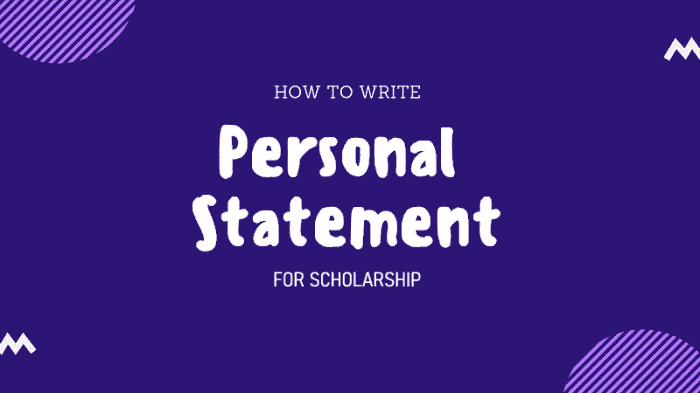
Have you been asked by the scholarship committee to provide a personal statement for a scholarship? Are you clueless on how to draft a statement of purpose for scholarship? Do you need a perfect step by step guide to get you started? Say no more! We got you covered. Today, you will master the art of writing a winning personal statement.
You will learn the following:
- What is a scholarship personal statement?
- Types of Personal Statement topics
- Parts of a Personal statement for scholarship
- Perfect step by step guide to writing a winning scholarship personal statement
- Tips on scholarship personal statement: Dos and Don'ts
- How to structure and format a personal statement
- Sample example of a personal statement for scholarship
- Sample example of personal statement for scholarship pdf
- Personal statement for scholarship application examples
What is a Scholarship personal statement?
A personal statement for scholarship is a short content that conveys the message that you are a perfect candidate for a scholarship in an undergraduate, graduate or postgraduate programme. In your personal statement for scholarship 500 words, you will be providing solid evidence and examples pertaining to your experience and motivation. Your personal statement will explain why the particular programme is the right one for you, how it's connected to your personality and previous studies and what changes you would make in your society if you follow the programme.
The purpose of a personal statement is to invite the admission committee to get to know you better. You are to convince the admission committee that you are a good fit for a chosen degree. The aim is not to impress the application committee. Rather, the goal is to point to the kind of student you are. Like sample scholarship application letter for masters degree, you have to do some self - reflection to figure who you are and your future goals. When you do that, you can easily transfer your individuality to the essay.
Check out: How To Write A Letter Of Intent For Scholarship (4 PDF Sample LOI Example)
Six (6) Types of Personal Statements Prompts
As earlier mentioned, your personal statement should share something about you. It should include aspects that have not been found in your résumé. It should indicate how deserving you are of the scholarship. It should be geared towards the scholarship provider's goals.
Usually there are various topics for composing personal letter for scholarship. You would choose one category prompt and develop your personal statement. Your choice of topic will determine the parts of your scholarship personal statement.
Prompt (1): Why do you want to attend this institution?
Simply let the committee know why you are interested in that institution. Focus on what makes the programme or scholarship so unique. Does it offer career services and facilities? Is it known for talented professors that you want to learn from?
Prompt (2): Overcoming a Problem
You will be asked to identify a problem or a failure you encounter. In personal statement for scholarship sample doc,this is where you will share how you overcame it along with the lessons you were able to learn. It could be bullying, addiction, loss of a family member or a close friend, moving to a new city etc. Share it and let the committee know the stuff of which you are made up.
Prompt (3): Creative topics
Some universities offer special, think - outside - the - box topics. They could be as tricky as "What can be actually be divided by zero?". In sample personal statement for scholarship application pdf like this, you could consider each question on its own. Brainstorm innovative ideas and see which ideas you feel passionate about.
Prompt (4): A Personal History of You
This topic asks you to relate an event in your life that incited a period of personal growth. You could also pinpoint a person who had a catalyzing effect on you and made you have a new understanding of yourself. Your first job, a unique talent that you have or a personal goal you achieved can be very catching ideas for your statement of purpose for scholarship application sample.
Prompt (5): Brainstorming New Ideas
This category of topics is about understanding how you relate with novel and diverse perspectives. You could refer to a time when you questioned a long - held belief. The reasons for changing your perspective could make a great scholarship personal statement for scholarship 500 words pdf. Universities want to know how you handle differences.
Prompt (6): Your Future Goals
What does your future look like? Do you want to be a professor? A chef? A journalist? This personal statement for scholarship application examples pdf prompt reflect on what you would like to become professionally. Through this topic, the scholarship committee wants to know how the scholarship would help you learn what you need to acquire so that you can achieve your career goals. They want to measure your level of awareness, vision and determination.
Parts of a Personal Statement for Scholarship
After you choose your topic, you may be tempted to quickly proceed with writing your sop for scholarship samples. Pause!!! You have one more step to take. You need to create an outline . An outline will help you to coordinate your thoughts and ideas. It will guide the direction of your writing and you would not be rewriting your content countless times.
There are two ways to create your outline. There is the process outline and the passion outline . If you want to discuss your personal growth, the process outline will help in explain the journey of your personal growth (before, during and after stages). If you want to share your passion, use the passion outline to relate various experiences that shaped you in becoming more competent.
After creating your outline, you can safely proceed with the sections of your statement of purpose for scholarship pdf.
Introduction Paragraph:
For example, say you are preparing a sample personal statement for fulbright scholarship. The introduction is the most sensitive part of your personal statement. Do you know why? You would need to grab the attention of your commitee and keep them reading. You could use a rhetorical question, a quick story, a surprising fact or simply a short explanation of what you will talk about in your content.
Body Paragraphs:
This part depends largely on your choice of topic and your choice of outline. If you are discussing about overcoming a problem, a personal history of you or your future goals, use the process outline and share the lessons, your background and your long - term career goals.
If, on the other hand, you choose to discuss a newly adopted idea, why you want to go to the school, or something creative, deploy the passion outline to think outside the box and relate your unique perspectives on life.
Just make sure that you are authentic, unique and use copious examples in your personal statement essay for scholarship.
Conclusion:
What if you are concluding your statement of purpose for fulbright scholarship? This is not just the part where you summarize the previous paragraphs. This is the point where you leave a lasting impression on your reader. Use a call - to - action or a hope for the future to explain why this scholarship is important to you.
Read: How to Write a Good Scholarship Thank You Letter (8 PDF Sample Examples)
The Perfect 8 Step - by - Step Guide to writing a Winning Personal Statement for Scholarship
Still concerned about how to start your example of personal letter for scholarship? Don't worry. Here is a step - by - step manual that can guide you from the minute you sight the essay prompt to the minute you hit "Submit".
Step One (1): Read your Prompts
Carefully read your topics. Understand what the scholarship committee is asking of you. Before choosing the prompt you want, try to grasp what the personal statement for university scholarship
should be like. Check carefully if there is anything like "Write on your topic in three pages of 600 words"!
Step Two (2): Be on the lookout for additional information
Are there rules and guidelines for additional information that may not be in the prompt? You need to read them carefully. Ascertain the kind of formatting that is required, when the scholarship application statement due date is or what you may need to submit with your personal statement.
Step Three (3): Brainstorm Novel Ideas
Don't rush to write the personal statement for applying scholarship with the first idea that pops up in your head. Consider various ways to answer the prompt you chose. Jot down all the ideas that come to mind and review them later.
Step Four (4): Outline your personal statement
Organize essential points and concepts of your content. As it was suggested earlier, this will help you coordinate your major ideas so that you won't forget them. In that way, you will write the best statement of purpose for scholarship.
Step Five (5): Create a mouth - watering introduction
When writing personal statement for scholarship, keep your thesis concise but at the same time, arrest the attention of your reader. Be more concerned about your story and less worried about big vocabulary. In a simple way, try to communicate the core concept of your content.
Step Six (6): Be yourself when writing the body paragraphs and conclusion
At this stage, make your scholarship statement example personal and relatable. Simply, write what you know. Find a way to share why your choice of topic is significant to you. Let the body paragraphs reflect your personal knowledge, experiences and passion. Make your essay as specific as possible and customize it to fit the scholarship.
Step Seven (7): Revise your personal statement
This time, re-read your personal statement sample for scholarship pdf with a critical eye. You can read it out loud and listen to the flow. Is it consistent? Is it logical? Is there a room for reworking?
Step Eight (8): Proofread, edit and hit "submit"
Look specifically for spelling and grammar errors. For example, say you are writing a fulbright personal statement example. Find a friend who has a strong command of the written word and can completely address the people alongside the content. Finally, submit your personal statement in the chosen electronic form (docx or pdf).
Tips: What TO do when writing a personal statement
- Start your personal statement for college scholarship with a captivating sentence so as to arrest the attention of the admission officers.
- Relate outside interests and passion of your course.
- Ensure you write what comes naturally.
- Have a close family relative or friend to proof read it.
- Be specific and express everything in short paragraphs.
Tips: What NOT TO do when writing a personal statement
- Don't attempt to sound too savvy.
- Don't procrastinate. Prepare the statement purpose for scholarship ahead of the deadline.
- Don't duplicate information from your resume.
- Don't spend too long on the introduction.
- Don't be dishonest. Yet, don't involve too much negative information.
Consider : How To Write A Good Scholarship Acceptance Letter (5 PDF Sample Examples)
Personal Statement Formatting
Now, here in Scholarship Tab , we say that the personal statement format for scholarship is as important as the content. So here is how to do a thorough formatting of your statement of purpose for scholarship sample.
Your personal statement must:
- be between 500 - 700 words.
- have short sentences of not more than 25 - 30 words.
- be between 1 - 2 pages.
- have a maximum of 47 lines.
- use headings (optional) to break up the content, eg "How did I develop my passion", "Why I wish to study in this college"...
- use Arial or Times New Roman font and size 12 - 14 px.
- be left - aligned and have 1.5 px line spacing.
Sample Personal Statement for Scholarship Application
Did you think we would leave you without a sample? Not a chance. Here is a personal statement sample for scholarship
of Melissa, a student applying for Masters in Creative Writing. Read and learn:
“Can you compose a story for me? I am a keynote speaker at a conference. I want to start with a story and arrest the attention of my audience. Can you handle that for me?” That was a favor asked by my endearing lecturer in my university days. I could tell that he reposed confidence in my writing skills. So, for the umpeenth time, I agreed to assist him in storytelling. Let me explain how I became the capital helping hand of many keynote speakers.
I always remembered myself with a pen and a piece of paper. I wouldn't tag myself as an enchanting speaker. But I was surprisingly celebrated for my essays in school. My maths teacher would always frown each time I murdered the solution of a mathematical equation or geometry on the board. However, you could see the English teacher's face light up whenever she praised my writing performance to my parents. Miss Katherine, my English teacher, soon became my muse for acquiring a bachelor's degree in English Literature in my early 20s.
In high school, my writing prowess was noticeable even amongst my peers. Soon, I was dragged to theatre stage plays. Was I asked to perform? Not exactly! I was asked to write theatre scripts. In time, the refreshing and full - of - life dialogues stole the hearts of the returning audience and we would always win.
In my university days, I worked as a copywriting intern in an advertising agency. One of our clients was a Non - Governmental Organization (NGO) aimed at combating the effects of gender inequality. I was particularly touched by their projects. So I gave my very best in composing a thought - provoking content for their publicity. I was soon informed that the NGO gained immense popularity in a short period of time. I was elated. One day, the founder of the NGO called me while I was on a break. I still remember her words:
“I just want to thank you for the article you wrote for us. Thank you, Melissa for sharing your talent. You have helped thousands of women gain confidence in what we do and feel protected. You should be proud of yourself!”
That one - minute call revealed my life time purpose - to put the bemoaning thoughts, unmet requests, unrealized dreams and unattended needs of unprotected women in writing. This propelled to establish my magazine called WWW - Writing for Wonderful Women.
That's why I want to study Creative Writing. I want to develop my niche in the publishing world. I know that with the lecturers of this program, I will sharpen my research and writing abilities. With your help, I could facilitate my dream - my dream of airing the views of less privileged women with a pen and a paper.
Check out: Top 20 Online Jobs for College Students 2021
Statement of Purpose for Scholarship Sample pdf
Did you like the above sample personal statement for masters scholarship? Do you want to remain inspired and get the best out of it before you write your own? Here is personal statement for scholarship pdf. Download it, digest it and compose your own masterpiece! Download statement of purpose for scholarship sample pdf
Sample Letter Examples Personal Statement for Scholarship
We understand that there are specific scholarships whose personal statement need to be tailored. We want to share them with you as we desire nothing more but for you to excel. Here are some leading examples:
Sample Fulbright Personal Statement
Fulbright is a popular US cultural program that aims at improving intercultural relations, cultural diplomacy and intercultural competence between the people in the USA and other countries.
Here is a sample example of the personal statement to get the fulbright scholarship.
PTDF Scholarship Personal Statement Sample
The Petroleum Technology Development Fund (PTDF) aims at qualifying graduates and professionals in the field of engineering, geology, science and management in the oil and gas sector in Nigeria. Do you want to become a PTDF beneficiary?
Write, edit and download your ptdf scholarship personal statement sample here.
KGSP Statement of Purpose
The Korean Government Scholarship Program statement of purpose kgsp is designed to equip international students with opportunities to study at higher educational institutions in Korea for academic degrees. So you would need to compose a thought – provoking personal statement for kgsp
Check out this link and see how a well accepted kgsp statement of purpose looks like.
CFA Scholarship Personal Statement Sample
The CFA Institute Scholarships are intended to promote the highest standards of ethics, education and professional excellence. There are various types of scholarship such as access scholarship, women's scholarship or regulator scholarship.
If you are eligible for any of the above, download the tailored CFA Scholarship personal statement for scholarship examples.
Nus Merit Scholarship Personal Statement
What about the nus merit scholarship personal statement? The program is a highly coveted scholarship that targets high calibre of individuals that showcase academic excellence and outstanding leadership qualities.
If you have presented and excellent record of leadership, check out the sample nus merit scholarship personal statement
Sample Scholarship Personal Statement for Masters
Are you interested in getting a masters degree? Were you asked to provide a thrilling personal statement?
Check out this smashing sample scholarship application letter for masters degree pdf
So, as you can see, with the proper guide and excellent personal statement samples, your personal statement will help the admission officers to know more about you as a student, your goals and how the scholarship will help you continue your education. So write memorable personal statement essay examples for scholarships that stand out among the hundreds of other submissions.
Latest Blog Posts
- Canada Work Visa Application Process
- Best MBA in USA 2024 - 2025
- H4 Visa Interview questions and answers (PDF for download)
- Online Masters in Psychology 2024-2025
- 26 Medical Schools In Canada For International Students
- 32 Artificial Intelligence Free Course With Certificate
- 20 MBBS In Abroad For Indian Students At Low Cost 2024
- 36 Best Fashion Schools In The World
- Best Scholarships
- DAAD Masters & PhD Scholarships for Sub-Saharan African Students 2024
- Brunel University London Life Long Learning Bursary 2024
- University of Stirling Karen Napier MSc Scholarship 2024
- University of British Columbia Schmidt Science Fellowship program for Canadian and International Students 2024
- IHE Delft MENA Scholarship for African Students 2024
- University of British Columbia Schmidt Science Fellowship 2024
- Queen Elizabeth Commonwealth Scholarships for Masters Students 2024
- Bonn SDG Fellowships for Developing Countries 2024
Scholarship Tips
Scholarships by country to study.
- United Kingdom
- United States
- South Africa
- Netherlands
- New Zealand
Scholarships by Category
- Postgraduate
- Undergraduate
- College School
- Entrepreneurs
- Bachelors Degree
- Women Scholarships
- Fully Funded
Scholarships by Country of Origin
- African Students
- Developing Countries
Scholarships by Institution / Company
- Flinders University
- German Academic Exchange Service (DAAD)
- University of Edinburgh
- Australian National University (ANU)
- The World Academy of Sciences (TWAS)

Scholarships by School
- University of Melbourne
- University Of Queensland, Australia
- University of Kent
- University of East Anglia
- Privacy Policy
- Terms of Use
Scholarships
- Undergraduate Scholarships
- Masters Scholarships
- MBA Scholarships
- Ph.D Scholarships
- Fellowship Scholarships
- Fully Funded Scholarships
- F1 Visa Interview Questions And Answers
- Scholarship Application Letter
- Letter Of Intent For Scholarship
- Personal Statement For Masters
- Motivation Letter For Scholarship
- Scholarship Acceptance Letter
Other Locations
- Scholarships in UK
- Scholarships in Canada
- Scholarships for Nigerian Students
- Scholarships for African Students
- Study Abroad Community
- Applying For Scholarships
7 Steps (And Examples) For Writing a Killer Personal Statement
David Jun 24, 2019
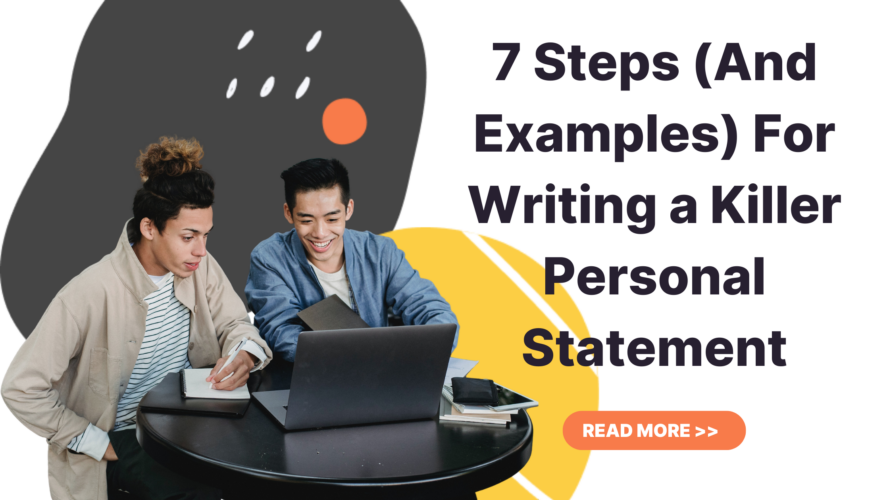
Get our best scholarship practices, insights & tips delivered to your inbox
Thank you for subscribing!
Personal statements (also known as college essays) are a major part of both college applications and scholarship applications. Unfortunately for some, writing a personal statement isn’t as easy as it sounds. How are you supposed to write a great essay that sets you apart from the competition? How are you supposed to talk positively about yourself without bragging and coming across as arrogant? All of this in only a couple hundred words? These are tough questions, but rest assured, we’ve got answers. This guide will walk you through a 7 step process that will help you write your personal statement, and increase your chances of getting into college and winning scholarships. In addition, at the bottom of this post, we have 7 (!) example templates that you can use to give you inspiration for your own personal statements. Buckle up, here we go!
Personal Statement vs College or Scholarship Essay
There is a lot of confusion about the differences between personal statements and scholarship essays. Before we begin, it’s important to clarify what a few of these commonly-used terms actually mean.
- Personal statement- an essay you must write for your college applications or scholarship applications to prove that you deserve to be accepted.
- Scholarship essay- this term is used interchangeably with ‘personal statement.’ They are basically the same thing.
- Essay prompt- the essay question or topic that you must write your essay on. This will be provided for you in the application.
- Supplemental essay- an additional essay that you may need to write for an application. This is not always needed and the topic may vary between schools or programs.
Now that we’ve explained the terms, let’s dig in and go through how to write a personal statement in 7 easy steps.
Step 1 – Understand the Different Question Types
Thankfully, colleges and scholarship providers give you some direction on what to write about. Each application contains an essay prompt that you are asked to respond to. While these prompts are open-ended and can be answered in many different ways, they usually fall into one of a few categories. Being able to identify the category an essay prompt belongs to is the first step in formulating an outstanding response. Let’s go through the category types.
The fastest path to earning scholarships
Simplify and focus your application process with the one-stop platform for vetted scholarships.
Prompt Category 1: Overcoming a Problem
“You don’t lose if you get knocked down; you lose if you stay down”. Muhammed Ali. “The only real mistake is the one from which we learn nothing”. Henry Ford. “I get knocked down, but I get up again, no you’re never gonna keep me down”. Chumbawamba. You get the idea 🙂 We all encounter hardship at some point in our lives. This type of essay prompt asks you to identify a problem or failure you faced and to describe how you overcame the problem, and what lessons you were able to learn. It’s worth noting that two essay prompts from The Common App this past year were from this category: Have a look and see:
Common App Question 2
The lessons we take from obstacles we encounter can be fundamental to later success. Recount a time when you faced a challenge, setback, or failure. How did it affect you, and what did you learn from the experience?
Common App Question 4
Describe a problem you’ve solved or a problem you’d like to solve. It can be an intellectual challenge, a research query, an ethical dilemma—anything that is of personal importance, no matter the scale. Explain its significance to you and what steps you took or could be taken to identify a solution.
Prompt Category 2 – A Personal History of You
These kinds of questions ask you to pinpoint an important person or event in your life that helped shape you into the person you are today. For these kinds of questions, you should write about a specific formative experience, key event, or key person from your life. It’s better to focus on a specific event or person than to tell your life story. This past year there were 2 questions of this kind in The Common App:
Common App Question 1
Some students have a background, identity, interest, or talent that is so meaningful they believe their application would be incomplete without it. If this sounds like you, then please share your story.
Common App Question 5
Discuss an accomplishment, event, or realization that sparked a period of personal growth and a new understanding of yourself or others.
Prompt Category 3 – Openness to New Ideas
Are you open to new ideas? How do you express these ideas, especially when relating to people with different beliefs than your own? This type of prompt aims to see how you engage with new and differing perspectives. One of the questions from The Common App this past year is a great example of this category.
Common App Question 3
Reflect on a time when you questioned or challenged a belief or idea. What prompted your thinking? What was the outcome?
Prompt Category 4 – Your Future Goals
What do you want to do when you grow up? Do you want to become an astronaut? A doctor? A content writer? These types of prompts are designed to help the committee understand what you’re interested in and how you plan to apply what you learn in college towards a future career. While there were no questions like this on The Common App this year, you might still see this kind of essay prompt if you are applying to a specialized program. Here is an example from the University of Southern California
Example “Your Future Goals” prompt:
Describe one example of how you might use design as a future architect. The admission committee will review this statement as a measure of your awareness, determination, and vision.
Prompt Category 5 – Why Do you Want to Go to This School?
These prompts are pretty much what the title suggests. In this type of personal statement, you should let the committee know why you are interested in that particular school.
Prompt Category 6 – Creative Prompts
Some schools value creativity, out-of-the-box thinking, and eloquent writing. As a result, you might get an essay prompt that asks you to write unique, and creative personal statements. For example, you might be asked how their school will prepare you for a job that won’t exist by the time you graduate. The University of Chicago, notorious for its strange prompts, has asked “What can actually be divided by zero?”. The key to these prompts is to show off clever, creative, out-of-the-box thinking that relates to what and where you want to study.
Step 2- Brainstorm and Plan
DON’T. OVERLOOK. THIS. STEP. Many students think they’ll finish faster if they skip the planning and just start writing. The truth is that good brainstorming will actually save you time. When you brainstorm effectively you will
- Be able to eliminate prompts that don’t work for you
- Be able to identify prompts that might work for you
- Come up with things you could write about for each prompt
- Be in the best position to start writing a great essay. This is much better than starting to write an essay only to realize that it’s not going to work and you need to start over.
After reading the essay prompt options, and figuring out which category it belongs to, take some time to write down some thoughts and ideas that you could write about. Here are some leading questions you can ask yourself that can help you think about what you can write for your personal statement.
Prompt Category 1: “Overcoming a problem” Brainstorming:
Think of some problems you have encountered in your life. Once you have a problem (or two), think about how you overcame it. If you aren’t happy with how you overcame it then you can focus on what you learned from the experience. Here are some ideas that might help you identify problems you’ve experienced that might be good to write about.
- Loss of a family member or close friend
- An injury or health problem (physical or mental)
- A difficult relationship with a family member, friend, or romantic partner
- Moving to a new city or state, or changing schools
- Revealing a sexual or gender identity to friends or family
- Issues with acceptance, bullying, addiction, body image, or anything similar
Prompt Category 2: “A Personal History of You” Brainstorming:
This category of essay prompts probably requires the biggest amount of brainstorming. These questions want to know about your background, identity, interests, accomplishments, and more. Here are some ideas you can brainstorm that might help you figure out what to write for this type of personal statement:
- When you first became aware of an important identity (for good or bad)
- Your first job
- Volunteer experience
- A class that motivated or inspired you in some way.
- A new hobby
- A memorable victory or failure
- A leadership position you took on
- A family member, friend, teacher, or celebrity who has impacted you.
- A personal goal you achieved
- A quality in yourself you are proud of
- A unique talent you have
Prompt Category 3: “Openness to New Ideas” Brainstorming:
The world is more polarized than ever before. For this reason, universities want to know how you handle differences. For these kinds of questions, it can be helpful to think about:
- Religion or Ethnicity
- Nationality
- Social class
- Country, state, or city of origin
- Sexual or gender identification
- Political beliefs
- If so have you ever spoken about them to anyone? How did it turn out?
Prompt Category 4: “Your Future Goals” Brainstorming:
Future goals tend to be based on what you’d like to study but can also include long-term career goals. It’s important to show determination, vision, and ambition in these kinds of personal statements. For these kinds of questions it can be helpful to think about:
- What you’d like to do professionally when you grow up
- Why you’d like to do it
- What kinds of things do you need to learn in order to get where you want to go?
- How will the things you need to learn help you?
- Does the school have a reputable program?
- Does it have a well-known faculty?
- Does it have state-of-the-art facilities?
- Does it have a great network of graduates who could be mentors?
Prompt Category 5: “Why this School” Brainstorming:
This kind of prompt requires much of the same brainstorming as the previous one. Ideas to brainstorm should be centered around why you want to attend this particular school. For example:
- Is there a program that makes the school special?
- Is the school known for a talented faculty or professors you want to learn from?
- Is the school affordable?
- Is student life alive and vibrant?
- Does the school offer excellent career services, programs, and facilities?
- Do you want to become involved with a certain sport or activity the school is known for?
- Are you interested in living in the city or town the college is located in?
Prompt Category 6: “Creative Prompts” Brainstorming (h3)
Since these are so unique, it’s hard to say what should be brainstormed. Consider each question on its own. Try to brainstorm a few creative, out-of-the-box ideas. See which ideas you feel most passionate about and take the writing in that direction.
Step 3: Choose the Best Topic
Maybe, for a “history of you” essay prompt, you’re debating between writing about a few things. Maybe you can’t decide between talking about volunteer experience, a friend who impacted you, or how your identity affected who you became. Now is the time to narrow it down and choose one topic you want to write about. Your topic should be one that you can write an interesting story about, one that highlights your personality, and one that shows a side of yourself that can’t be found in your transcripts or resume. If you aren’t sure which to choose, you can try this tactic of freewriting to see what comes easiest to you. The freewriting strategy recommends writing about a topic in an open way to see which topic is the easiest to write about, and which topics let you talk about the best ideas. If you start coming up with a lot of ideas and things to write about for one of your topics, go with it! If not, move on to your next topic and try freewriting again.
Step 4: Create An Outline
Now that you have your topic, it’s time to create an outline on how to do it! Like brainstorming, you should not skip this step! Creating an outline is like mapping out your essay. It makes the writing much much easier, and in the long run, will save you lots and lots of time. When you have a good plan, you don’t end up rewriting the first sentence of your essay 100 times. There are two common ways to structure your personal statement – the journey structure and the passion structure. If you are writing about a time of personal growth, you should probably consider the journey structure. The journey structure focuses on the before, during, and after of your personal growth. If you plan to write about something you love doing, we recommend using the passion structure. The passion structure consists of multiple experiences all related to a single theme (e.g., your passion). This structure works well when you have a number of different experiences across your life that all played a significant role in shaping who you are today. We have a whole separate post that talks about both journey and passion structures for personal statements .
Step 5: Writing Your Personal Statement
Now that you have your outline, you are ready to finally start writing your personal statement! If you’ve done everything until now, including writing a good outline, this should be quick and easy. Keep in mind that no matter how many words you are asked to write, your personal statement should have an introduction, body paragraphs, and a conclusion. We’ll quickly go over how to write each one
Step 5a – Introduction Paragraph
The introduction is crucial. It is your chance to grab the committee’s attention and convince them to keep reading. Your introduction should contain three things:
- An attention-grabbing first sentence (a hook)
- A short explanation for what you will talk about in your essay
- The thesis statement in which you address the essay prompt.
Your introduction should be short, sweet, and to the point. Some ideas you can use for a hook are:
- A rhetorical question
- A memorable quote
- A quick story
- A surprising fact
- A strong surprising statement
If you need more detailed guidance, this post talks about how to write a scholarship essay introduction
5b) How to Write Body Paragraphs
This depends on so many things. It depends on if you decide to use a journey structure, a passion structure or something else entirely. For that reason we’ll simply give you some tips to keep in mind while writing the body of your essay:
Personality
What makes you unique? What makes you, well…you? SAT scores and grades aren’t relevant here. What can you tell the committee about your character? What are some of your achievements? What are some of your goals for the future? The personal statement is the place to give readers an insight into who you are as a person aside from your test scores. Use this space to charm and impress.
Authenticity
It will help you charm and impress if you are honest and genuine. Write about what you hold near and dear to your heart, and not what you think readers are expecting to hear from you. Also, speak in your own voice that shows who you are! Don’t look for big synonyms because it makes you sound smarter. Be yourself. Everyone else is taken.
Concrete Examples
Stories and examples are powerful devices that help people remember who they are. If you are passionate about animals, writing about your volunteer experience in an animal shelter is much more powerful than writing about how you love animals. Committees have to read through hundreds of scholarship applications. Examples and anecdotes will help your essay stand out. Better to prove it than to say it.
Know your Reader
If you are writing a personal statement for a scholarship, your goals should also align with the mission of the scholarship committee. The same can be said of a unique school or program. To understand the mission, you’ll have to get to know the organization. You can do this by browsing their website.
Stay within the required word limit. If the maximum word limit is 500, don’t write 800 words. This is a sure-fire way to get you disqualified or to have the committee stop reading after about 500.
5c) How to End your Personal Statement
Your conclusion needs to give the committee one last impression of who you are. It should leave them remembering you. Your conclusion should do these three things:
- Wrap up your story by summing up your main points
- Clarify your thesis in a new and fresh way
- Answer the question: Why is all this important?
Some ideas on how to answer the question: why is this important
- A big thought
- Hope for the future
- A call to action
If you need more guidance, read this post that talks about how to end a scholarship essay
Step 6: Edit Your Statement!
Once you finish writing, it’s super important to read the whole thing and to edit it before you turn it in. Editing your work means reading it through several times until you are confident that it sounds good and that there are no mistakes in it. Before you do this, however, it’s a good idea to take at least a 12-hour break from the computer. Giving yourself a break will give your brain and your eyes some time to relax. You will be fresher and in a better state of mind to catch mistakes if you give yourself some time to breathe. When you start editing, read your essay from top to bottom. Read it several times. Pay extra close attention to spelling, grammar, punctuation, capital letters, and sentence structure. Your personal statement is a reflection of you and your standard of work. If you submit an essay with mistakes in it, that says far more about who you are than anything you write in your statement. Submitting work with mistakes may give the committee the impression that you are lazy or careless. You obviously don’t want to do that. Once you’ve read everything over everything and are confident that it’s flawless, have a family member, friend, teacher, or counselor look over it to make sure you didn’t miss anything. An extra pair of eyes can give a fresh perspective, and help you catch anything you may have missed.
Step 7 – Hit the Submit button!
Finally! It’s time to submit your essay. Great job putting in all the hard work. Go buy yourself a cupcake or treat yourself to something nice. You earned it.
Example Personal Statements
Need some extra inspiration? We’ve got 7(!) sample personal statements that you can use to give you ideas and ensure you are on the right track. Each of the 7 personal statements below is for a different kind of prompt, as was categorized above. Some of the prompts are taken from this year’s Common App questions.
Prompt Category 1 – Overcoming a Problem Sample Essay
Common App Essay Prompt 2: The lessons we take from obstacles we encounter can be fundamental to later success. Recount a time when you faced a challenge, setback, or failure. How did it affect you, and what did you learn from the experience? When I was a sophomore in high school, my parents decided that it was a good idea for me to spend less time on the couch playing video games and more time moving my body. They encouraged me to try out for the high school swimming team. I wasn’t particularly talented at the sport, but I did have a number of childhood swim lessons up my sleeve. It might also be a good time to mention that I went to a small private high school that accepted everyone onto their sports teams, so I didn’t have much to lose Another thing worth mentioning is that I am from Minneapolis where we spend many winter days in below zero weather. Jumping into a not-heated-enough indoor pool at 6 am, 3 days a week isn’t exactly enticing. But, for one reason or another and against all odds, I didn’t put up much of a fight. I guess I knew deep down inside that it would be good for me to start doing something else with my life besides sitting behind a computer screen all day long. As expected, I was accepted onto the swimming team but at a big cost- I was by far the weakest link. I seemed to overlook this minor detail and didn’t foresee the toll that it would take on me and on others. I quickly realized that I couldn’t just dance around the pool swimming like a drowning dog. I had a team that was counting on me, and in some weird way, I was counting on myself. Despite being majorly out of my comfort zone, I started to go to the gym a few times a week after school to increase my strength. I worked hard during swim practice and even put in some hours on the weekend. I had never pushed myself like that before, and I was really proud to see what I was capable of. I may not have gone home with any medals, but by the end of the year, I had increased my speed and had mastered the butterfly stroke. It’s the little things in life, right? My parents also seemed pleased by the fact that I was no longer glued to the couch every day after school. I weirdly found joy in the sport, which was the last thing that I expected to find. I am much more open to trying new things now and have a lot more confidence in myself.
Prompt category 2 – A Personal History of You Sample Essay
Common app question 1: “Some students have a background, identity, interest, or talent that is so meaningful they believe their application would be incomplete without it. If this sounds like you, then please share your story.” It was April of my freshman year of college and all my friends were heading to Cancun, Mexico for the quintessential college Spring break trip. I, on the other hand, was heading to Haiti, to volunteer with Habitat for Humanity for 7 days to rebuild homes that had been destroyed in the hurricane. For some reason that my friends found to be odd, the thought of my pasty white skin frying on the hot Mexican sand alongside hundreds of other college students didn’t quite appeal to me. I have always been a woman of my own, and have never been one to follow in the footsteps of others. Sometimes that has gotten me into trouble, but more often than not it has made me a strong and independent young woman who isn’t afraid to stand out and be different. I boarded the plane with my 12 other volunteer mates, with no expectations. I had never volunteered abroad, nor had I ever traveled alone without my family members. Not to mention, I was the only college freshman on the trip. I was looking forward to the wisdom that my elder companions were to impart on me. Needless to say, the volunteer trip completely changed my outlook on life. While my friends returned with stories of drinking and partying (I’d hardly call that a story), I returned with the deep connections I’d formed with my volunteer mates and a passion for helping communities overcome natural disasters. After coming back from that trip, I decided to double major in emergency management and psychology. It is my dream to one day hold a position in the Red Cross. For now, I will study and absorb as much information as I can, and continue to volunteer around my local community. And, if the opportunity arises for me to take my knowledge and skills abroad, I will gladly do so again .
Prompt category 3 – Openness to New Ideas Sample Essay
Common App Question 3 – Reflect on a time when you questioned or challenged a belief or idea. What prompted your thinking? What was the outcome? My mom always told me that happiness is right under your nose. Growing up, despite my privileges, I always dreamed of being elsewhere. My house wasn’t big enough, my clothes weren’t nice enough and my town was boring. I would sift through National Geographic magazines at the library, dreaming of laying on a tropical beach in Bora Bora or walking the cobbled streets of Lisbon. I was always searching for whatever else was out there. I promised myself that as soon as I finished high school, I would skip this boring excuse of a town and get out of here to see the world and find my true calling. Once I started college, I used my newfound freedom to my advantage. The long breaks during school allotted me plenty of time to start seeing the world. I worked hard during the semester, in both my studies and my nannying job, and was able to fund my travels around the world. I saw the Eiffel Tower, walked on the Beijing wall, and was bewildered by the northern lights in Norway. During my junior year of college, I spent six months studying abroad in Barcelona. I binged on paella and Spanish omelets during the week, and on pasta in Italy and schnitzel in Germany over the weekends. After the semester was over, I extended my visit and did a homestay with a local family in northern Spain. I became part of their family that summer, doing chores around the house and running to buy bread from the local bakery. Despite loving the experience, after a while, I found myself missing the sub-par greek salads from the local diner in my hometown and the familiar faces I’d see when I went for Sunday morning bagels. I knew then and there that I was ready to come home. I returned home with a newfound realization of how massive the world is and how much of it I want to see. But, I also returned finally to understanding what my mom meant when she told me all these years that happiness is right under my nose. True happiness is found when you’re around people who love and care about you. I will definitely keep traveling the world, but I won’t be taking my home for granted any time soon.
Prompt Category 4 – “Your Future Goals” Sample Essay
Describe how you might use what you learn in university in a future career. The admission committee will review this statement as a measure of your awareness, determination, and vision. My name is Billy Meijers and I am a senior at York Secondary School. I plan to pursue my Bachelor’s degree in early childhood education. After I finish my bachelor’s degree, my plan and hope is to work as an elementary school teacher in Provo. I have always known that I wanted to work as a teacher, thanks to my passion for working with children and teaching others. Throughout high school, I volunteered at a local homeless shelter with children and also worked as a day camp counselor during my summer vacations. While teaching and working with children has always come naturally to me (which of course is a strong asset to have as a teacher) these qualities are not enough to make you a successful teacher. A teacher needs to know how to manage their classroom, develop curriculum, and work with a diverse group of students who come with their own unique needs. My desire to develop these skills is what is leading me to study early childhood education in college. I am happy to say that I have already learned so much in high school. I am fascinated by the childhood development and psychology courses I have taken thus far. It’s so important to understand the psychology of young children to be able to respond to their needs and teach them. Learning about cognitive and behavioral psychology will help me within the classroom setting and I’ll be able to mold my curriculum using these skills. I can’t wait to continue my studies and acquire more skills. I still have so much to learn about planning curriculum and managing classrooms. Next year I plan to start an internship at a local elementary school as a teacher’s assistant. With any luck, the next 4 years will prepare me to be an amazing teacher where I will be able to make a real difference in the world!
Prompt Category 5 – “Why This School” Sample Essay
There are thousands of universities and colleges. Why are you interested in attending Michigan? I always thought that I would follow in my family’s footsteps and go to George Washington University. When I say family, I am referring to my entire family- grandparents, parents, older siblings, cousins, you name it. I was the typical three-year-old child decked out in GW attire from head to toe, and you better believe that there is plenty of photo evidence to prove it. I never really gave my future much thought, because it seemed set in stone that I would pursue my bachelor’s degree at GW University. My parents were so excited and never shied away from talking about it. However, everything changed for me when I visited the University of Michigan during my junior year of high school with my theater company. I met several students in the theater department and connected with them right away. They told me all about the program and it instantly felt like a great fit. I had the privilege of seeing several plays during the weekend and my eyes glowed with both admiration and envy. As I looked up at that stage I knew wholeheartedly that that was where I wanted to be. Upon returning home, I was surprised to find my mind wandering, dreaming of starring in plays at the University of Michigan. How would my family react if I didn’t carry on the GW legacy? I was so scared to share the news with my family and felt a gut-wrenching feeling for betraying our family tradition. But I couldn’t lie to myself- it was so obvious where my heart was. I shared it with my family and they took the news better than I thought. They were sad that I don’t want to go to GW, but they want me to follow my dreams. I would be honored to study theater at the University of Michigan. I have so much to learn from the excellent instructors and fellow students, and a lot to share with others.
Prompt Category 6 – “Creative Prompt” Sample Essay
By the time you graduate from college, there will be jobs that don’t exist today. Describe one of them and how The University of Chicago might prepare you for it. With technology growing what feels like a million miles per second, and new inventions being created on the regular, it’s hard to know exactly what the future holds. The Institute for the Future predicted that 85% of jobs that students will perform in 2030 don’t exist yet. So, is there even a point in going to university if you’ll end up working in a job that doesn’t exist yet? Absolutely! University can prepare you to work in a variety of fields, and not only for one specific job. In fact, because the future is so unknown, the best thing you can do for yourself and your future is to get a college degree. Let’s take for example social media influencers. This is a new job that has only become mainstream over the last several years. Many social media influencers went to college and pursued degrees of all sorts. While they may not be directly using the degree they got in college, they definitely gained a lot of valuable skills from their studies, which helped contribute to their success today. College teaches many invaluable skills like critical thinking, writing, and communication. It also teaches you soft skills like teamwork, learning how to live independently, learning how to manage your schedule, and much much more. Let’s imagine how university courses can prepare anyone for jobs a hypothetical job that doesn’t yet exist. With the heavy presence of social media and technology in all of our lives, you can imagine that many people are rapidly becoming addicted to their devices. Introducing the “digital detox therapist-” a career that is likely to exist by 2030, if not before. While there is currently no academic path to becoming a digital detox therapist, there are plenty of psychology and marketing courses that can prepare students for this career. Digital detox psychologists would need to have a background in addiction, cognitive psychology, and social psychology. They will also need to understand consumerism and marketing. As you can see, while there is no direct way to study for this career, college can still benefit you in the long run and make you a sought-after candidate for this hypothetical career and presumably many others.
- Scholarship Essay
- writing tips

David Tabachnikov is the CEO of ScholarshipOwl. Formerly at Waze and Google, David is an experienced CTO/R&D manager with over 10 years of experience of leading tech teams. David fervently believes that students should have greater access to education, and is passionate about using technology to help them achieve that goal.
Related Stories View All
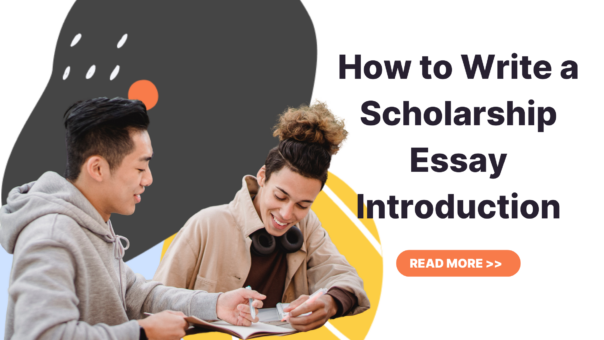
How to Write a Scholarship Essay Introduction (With Example)

Scholarships for Veterans

Get College Scholarships Without Having to Write an Essay
Get started with scholarshipowl.
Simplify and focus your application process with the one-stop platform for vetted scholarships
How to Write a Personal Statement for Scholarships

Access thousands of exclusive scholarships for free

"Be Bold" No-Essay Scholarship
Writing a Scholarship Personal Statement
Begin early, carefully read the prompt, editing and submission, frequently asked questions about scholarship personal statements.
The most common requirement across all scholarship applications is undeniably the scholarship essay, a subsection of which is the scholarship personal statement . Although it may seem daunting for the fate of your scholarship to rest on a single essay, think of the personal statement as an opportunity . A personal statement for these applications is your chance to show the scholarship committee why you are the best candidate for the award, giving them a brief glimpse into your accomplishments and background.
For general tips on scholarship submission writing, the Bold.org guide on scholarship essays is a great place to start. But, for more help with writing personal statements specifically, keep reading for the guide outlined below.
Here at Bold.org you can find even more exclusive, unique scholarships just for you. Start building a strong profile here to begin applying.
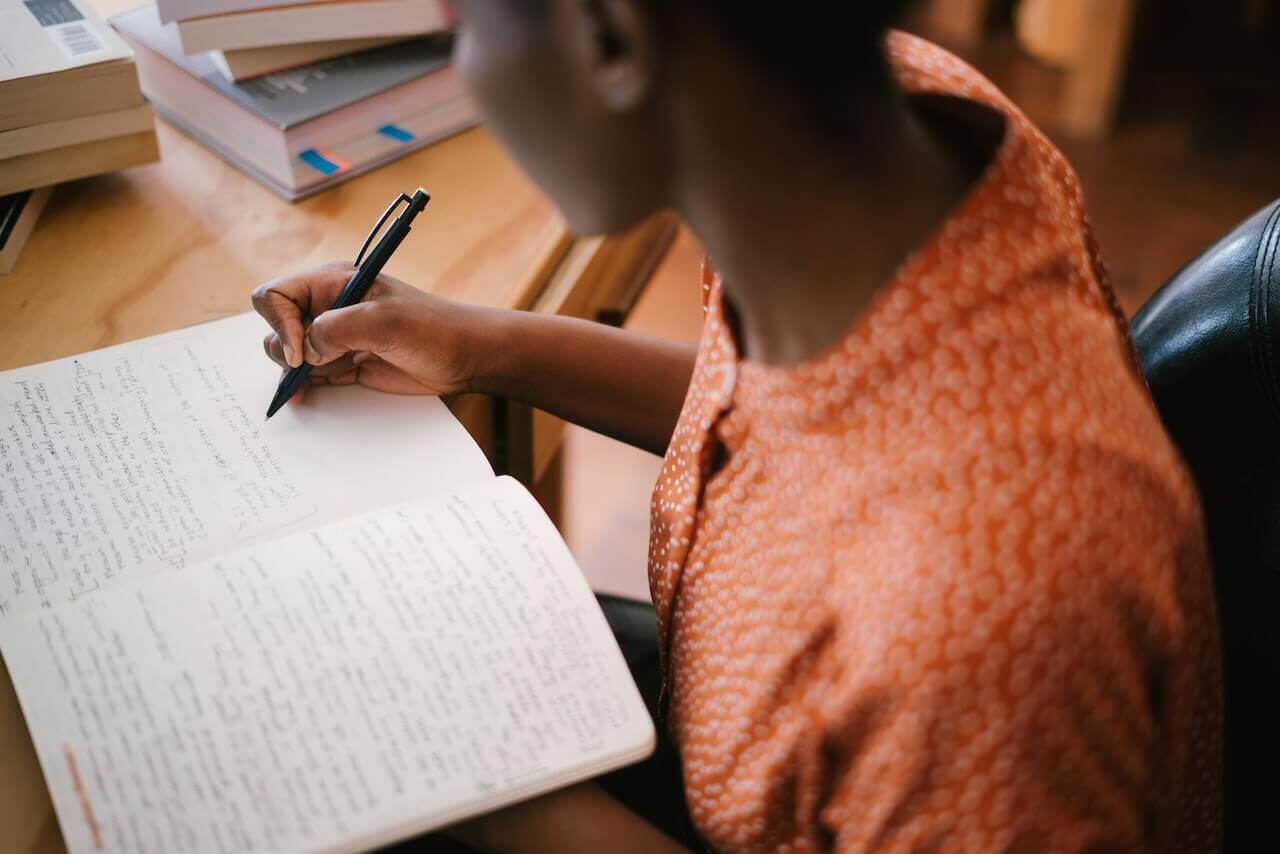
The distinction between a scholarship personal statement and an essay is not always an obvious one. There is often a lot of intersection, and a scholarship may ask you to write an essay that feels much like a personal statement that colleges typically require.
In general, scholarships will almost always give essay prompts to applicants, which can vary greatly. For instance, a community service scholarship may ask you to write about how you plan to use your educational background to better your community, while an engineering scholarship may ask you why you chose to pursue a career in STEM .
Get Matched to Thousands of Scholarships
Create your Bold.org profile to access thousands of exclusive scholarships, available only on Bold.org.
By contrast, a personal statement is oftentimes more open-ended . It's a piece of writing that introduces you as a candidate and says something about your background and motivations. The scholarship personal statement is a place to share your relevant personal qualities and personal growth to illustrate why you are the right candidate.
You can include things like family background, test scores , other scholarships or awards you have received, and anything else that you think may be relevant. As you read on to learn more about writing a great personal statement, check out the table of contents below to see what exactly this guide will overview.
- Beginning early
- Carefully read the prompt
When completing a personal statement for scholarship applications , it is always best to start writing as early as possible . Not only will doing so help you remain organized and cognizant of deadlines , but it will give you more time to think, write, edit, and gain valuable insight into what it is that you are trying to express.
Additionally, writing your personal statement early on can give you more time to address any potential obstacles or issues that may get in your way. Beginning early may feel tedious, but it is the first step to writing the best personal statement possible.
This step may seem obvious, but that's only because it is incredibly important. Writing a successful personal statement for scholarship reviewers to consider is heavily dependent on a thorough understanding of the prompt .
The prompt may be as wide as "write a personal statement," or it may be more specific, asking applicants to relate their personal statement to a specific topic or idea. An effective personal statement addresses all parts of the given prompt and demonstrates an understanding of what is being asked. Finding sample personal statements online is a great way to see how successful scholarship applicants have connected their personal story to the prompt in order to produce an effective personal statement.
The great thing about personal statements is that the name alone already gives you some direction: personal . Personal statements should be about you and your experiences , so when you brainstorm, think about your life story thus far. Consider things like your notable personality traits, skills, accomplishments, passions, difficulties and obstacles, goals, extracurricular activities, etc., and see how these may relate to the scholarship you are applying for . Additionally, you can think about the world around you, like how certain family members have been role models to you, or how an ethical dilemma helped you realize something important.
Make sure that every personal statement for scholarship applications is authentic. Don't attempt to write what you think the reader wants. Instead, you should do your best to write honestly and truthfully. Authenticity is something that strong personal statements have in common, so when brainstorming yours, be sure to be honest .

In terms of actually writing your scholarship personal statement, a logical structure is integral to an effective and well-thought-out statement. The typical parts of a scholarship personal statement are the introduction, the body, and the conclusion .
Everyone writes outlines differently, but now that you've brainstormed your ideas, organize them into these three parts and consider the most effective way to convey your message. This is where finding online examples may come in handy to get started on structure.
Your writing should be authentic, structured, and grammatically correct in order to be successful. Do not offer any drawn-out essay responses, and keep your work concise. Scholarship committees may read hundreds of personal statements, so you want your work to stand out without being too long or tedious . A short personal statement that conveys your authenticity is a great way to impress committees; show them you can do more with less .
In terms of writing, excellent grammar and language skills are integral . Make sure you have varied sentence structure to maintain the flow of your writing, and maintain a logical movement from point to point. If this is something you struggle with, see if you can talk to teachers, counselors, or other campus resources to see if you can get help with writing your personal statement.
Finally, stay away from clichés like "from a young age," or inspirational quotes; you don't want to reiterate things that others have already written. Your personal statement should feel honest and unique, without seeming trite or forced. Fortunately, after successfully brainstorming and outlining your personal statement, writing shouldn't feel too difficult.
#1: Introduction
The introduction should grab the reader's attention so that from the start, they're invested in your personal statement. For scholarship application reviewers who read tons of personal statements, something unique and attention-grabbing can be a welcome break.
This does not mean that you should attempt to be humorous or even raunchy. Although humor has its place in formal writing, it is important to remember that you are still writing a personal statement for scholarship applications, which is both personal and professional .
Find a unique way to introduce yourself and begin to describe who you are. This could range from your sexual or gender identity to your educational background--whatever you feel is a strong indication of who you are and how you are the best applicant for this scholarship. As your introduction comes to an end, lead into the main part of your personal statement. For scholarship application readers, the introduction is the first writing they will see from you, so be sure to start off strong and organized.

Scholarship application boards want to know why you are the best fit for the award. So, the main two points you should cover in your body paragraph are:
- Why you are currently the best candidate for the scholarship
- How this scholarship connects to your future goals and plans
However, because almost everyone will be writing on these same topics, you should still try to make your essay stand out. A great way to do this is to include a relevant anecdote in your personal statement. Whether you're discussing a research query or a family member, the best personal statement examples use anecdotes to show and prove who the writer really is and why they deserve a scholarship, as opposed to merely stating it .
For instance, instead of stating that you care about your community, consider sharing a specific examples of volunteer work or other involvement to illustrate that you care for your community .
#3: Conclusion
Finally, begin the conclusion of your personal statement with a brief summary of why you are the best candidate, and then conclude with how this scholarship will fund your degree , and thus your future. Illustrate why your future goals make you the best applicant, to impress the readers.
Editing is the final step of the process. When writing a personal statement for scholarship applications, just like in any piece of academic writing, having grammar mistakes is a huge red flag . Not only can errors prevent readers from having a clear sense of what you want to say, but they also give an unprofessional air to your writing, so be sure to edit your work thoroughly.
After editing your personal statement yourself, which includes proofreading as well as improving your writing, don't be afraid to share your writing with someone else . Even if you don't have access to a prestigious scholarship advisor, having a friend, parent, teacher , or counselor read your work can give you important insight on your work. Getting multiple points of view on your writing can help you develop a truly strong personal statement.
When you are finally done writing your personal statement or any other scholarship essays, submit your application before the deadline and breathe easy knowing you put your best foot forward.

What should I include in a personal statement for a scholarship?
At the bare minimum, a personal statement for a scholarship should include why you are the best candidate for the scholarship and how the scholarship will impact your future plans and goals . Your writing should be authentic and honest, and you should try to really convey why you are the ideal candidate for the scholarship.
Additionally, although you should keep your writing concise , employing a relevant story from your life can help you illustrate why you are the ideal candidate and is a great way to set yourself apart.
How do I make my scholarship application stand out?
There are several ways to make your scholarship application and personal statement stand out. First and foremost, you should be sure to remain organized and gather all of your necessary materials correctly. This means using correct grammar, writing professionally, and getting necessary documents like letters of recommendation and transcripts in time.
Once you meet these expectations, you are more likely to be a viable candidate. In order to really stand out, however, two important writing practices are authenticity and sincerity. Successful personal statement examples all seek to accurately and honestly portray who the writer is so that scholarship providers really feel as though they are giving their money to a worthy candidate. A personal statement can be as well written as possible, but if the scholarship committee gets the sense that it is not an honest depiction, then it won't be successful.
Using anecdotes to illustrate your unique personality can be a great way to portray who you really are. As you go on to write your personal statement, remember to bring out your personality and share your true self.
Once you have a strong personal statement written, find exclusive scholarships to submit and apply to at Bold.org .
Related Posts
Do scholarships cover room and board, celebrate black history month with our "black leaders scholarship", easiest scholarships to get in 2024.

IMAGES
VIDEO